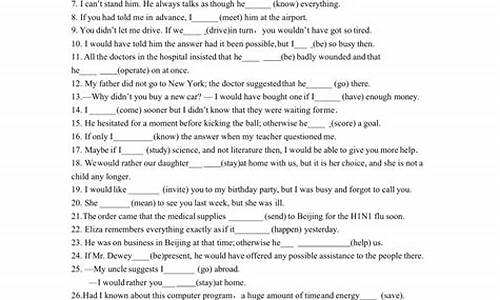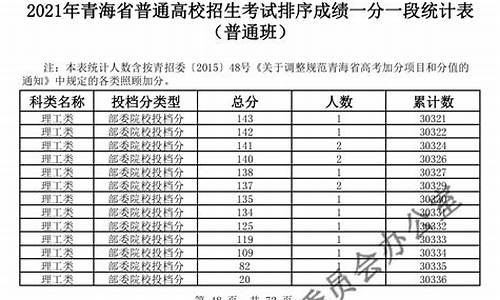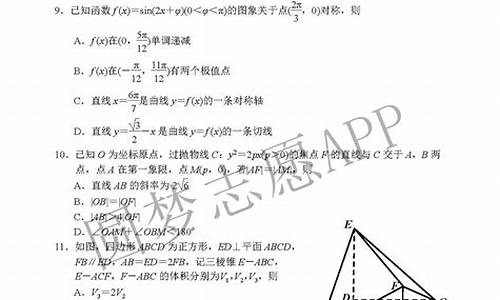您现在的位置是: 首页 > 教育改革 教育改革
近几年英语高考虚拟语气真题_2014高考虚拟语气真题
tamoadmin 2024-05-29 人已围观
简介1.高考英语听力真题「全国I卷」2.高三英语试题3.谁还记得英语中虚拟语气的规律啊虚拟语气在条件句中的用法:条件句有真实条件句和虚拟条件句两种。真实条件句所表示的假设是有可能发生的,此时主句不用虚拟语气;而虚拟条件句则表示一种假想,与事实相反或不大可能会发生,此时用虚拟语气。如:If I have time,I will go. 假若我有时间,我就去。 (陈述语气) If I were you,I
1.高考英语听力真题「全国I卷」
2.高三英语试题
3.谁还记得英语中虚拟语气的规律啊

虚拟语气在条件句中的用法:
条件句有真实条件句和虚拟条件句两种。真实条件句所表示的假设是有可能发生的,此时主句不用虚拟语气;而虚拟条件句则表示一种假想,与事实相反或不大可能会发生,此时用虚拟语气。如:
If I have time,I will go. 假若我有时间,我就去。 (陈述语气) If I were you,I would go. 假若我是你,我就去。 (虚拟语气 ) 时态类型 主句谓语形式 条件句的谓语形式 例句 与现在事实相反 would/should/could/might+ V原形 动词过去式 did
*be 多用were 1. If I were you, I should study English.
2. I would certainly go if I had time. 与过去事实相反 would/should/could/might + have done 动词过去完成式
had done 1. If you had taken my advice, you would not have failed in the test.
2. If I had left a little earlier, I would have caught the train. 与将来事实相反 would/should/could/might + V原形 ①动词过去式
②should +V原
③were + to do 1.If you came tomorrow, we would have the meeting. ①
2. If it were to rain tomorrow, the meeting would be put off.③ *规律总结:从句都往过去推一个时态,如:与现在相反的if从句就用过去时;与过去相反用过去完成时(即过去的过去)
注:特别说明
1、l would/should/could/might主句谓语中的should主要用于第一人称后;would表示结果还表示过去经常常常做某事,might表示可能性,could表示能力、允许或可能性。比较:
If you tried again ,you would succeed. 要是你再试一试,你就会成功的。 (would表结果)
If you tried again, you might succeed. 要是你再试一试,你可能会成功的。 (might表可能)
If you tried again ,you could succeed. 要是你再试一试,你就能成功了。(could表能力)
2、错综时间虚拟条件句 即条件从句与主句所指时间不一致,如从句指过去,而主句即指的是现在或将来,此时应根据具体的语境情况,结合上面提到的三种基本类型对时态作相应的调整:
If it had rained last night, the ground would be wet now. 要是昨晚下过雨的话,现在地面就会是湿的。
You would be much better now if you had taken my advice. 假若你当时听我的话,你现在就会好多了。
3、If虚拟条件句的否定(含蓄条件句) 常考两个句型:If it weren’t for…和If it hadn’t been for…,其意为“若不是(有)” “要不是”。如:
If it weren’t for water, no plant could grow. 要是没有水植物就无法生长。
If it hadn’t been for your assistance ,we wouldn’t have succeeded.
=But for your assistance ,we wouldn’t have succeeded.
=Without your assistance ,we wouldn’t have succeeded.如果没有你的帮助,我们不会成功的。
4、If虚拟条件句的倒装形式,即把were, had, should置于句首。例:
Were I in school again (= If I were in school again), I would work harder.如果我能再上一次学,我会学习得更努力。
Had you asked me, I would have told you. (=If you had asked me,…)如果你问我,我会告诉你。
高考英语听力真题「全国I卷」
这句话完整应为:
It is suggested that he should follow the instructions to operate the machine。
should经常省略,这就是为什么选A原形的原因。
高三英语试题
2014年高考英语听力真题「全国I卷」
高考听力语言材料一般来源于实际生活,围绕一个日常生活话题展开,涉及文化教育、人物、科普、时事等。为了帮助大家备考,我分享了一些英语听力试题,希望能对大家有所帮助!
第一部分 听力(共两节,满分30分)
做题时,先将答案标在试卷上。录音内容结束后,你将有两分钟的时间将试卷上的答案转涂到答题卡上。
第一节(共5小题;每小题1.5分,满分7.5分)
听下面5段对话。每段对话后有一个小题,从题中所给的.A、B、C三个选项中选出最佳选项,并标在试卷的相应位置。听完每段对话后,你都有10称钟的时间来回答有关小题如阅读下一小题。每段对话仅读一遍。
例:How much is the shirt?
A. £19.15. B. £9.18. C. £9.15.
答案是 C。
1. What does the woman want to do?
A. Find a place. B. Buy a map. C. Get an address.
2. What will the man do for the woman?
A. Repair her car.
B. Give her a ride..
C. Pick up her aunt.
3. Who might Mr. Peterson be?
A. A new professor.
B. A department head.
C. A company director.
4. What does the man think of the book?
A. Quite difficult..
B. Very interesting.
C. Too simple.
5. What are the speakers talking about?
A. Weather.
B. Clothes.
C. News.
第二节(共15小题;每小题1.5分,满分22.5分)
听下面5段对话或独白。每段对话或独白后有几个小题,从题中所给的A、B、C三个选项
中选出最佳选项,并标在试卷的相应位置。听每段对话或独白前,你将有时间阅读各个小题,每
小题5秒钟;听完后,各小题将给出5秒钟的作答时间。每段对话或独白读两遍。
听第6段材料,回答第6至7题。
6. Why is Harry unwilling to join the woman?
A. He has a pain in his knee.. B. He wants to watch TV. C. He is too lazy.
7. What will the woman probably do next?
A. Stay at home. B. Take Harry to hospital. C. Do some exercise.
听第7段材料,回答第8 、9题。
8. When will the man be home from work?
A. At 5:45. B. At 6:15. C. At 6:50.
9. Where will the speakers go ?'
A. The Green House Cinema. B. The New State Cinema . C. The UME Cinema.
听第 8段材料,回答第 10至 12题。
10. How will the speaker go to New York?
A. By air. B. By taxi. C. By bus.
11. Why are the speakers making the trip?
A. For business.
B. For shopping.
C. For holiday.
12. What is the probable relationship between the speakers?
A. Driver and passenger
B. Husband and wife.
C. Fellow workers.
听第 9段材料,回答第 13至 16题。
13. Where does this conversation probably take place?
A. In a restaurant. B. In an office. C. In a classroom.
14. What does John do now?
A. He?s a trainer. B. He?s a tour guide. C. He?s a college student.
15. How much can a new person earn for the first year?
A. $10,500. B. $ 12,000. C. $ 15,000.
16. How many people will the woman hire?
A. Four. B. Three. C. Two.
听第10段材料,回答第17至20题。
17. How long has the speaker lived in a big city?
A. One year.
B. Ten years.
C. Eighteen years.
18. What is the speaker?s opinion on public transport?
A. It?s comfortable. B. It?s time-saving. C. It?s cheap.
19. What is good about living in a small town?
A. It?s safer. B. It?s healthier. C. It?s more convenient.
20. What kind of life does the speaker seem to like most?
A. Busy. B. Colourful C. Quiet.
参考答案:
1-5 ABCBA 6-10 BCACA 11-15 ACBCA 16-20CBCAB
;谁还记得英语中虚拟语气的规律啊
答案选D
全文的意思是:这个打印机的质量很好。如果第一年坏的话,我们会承担修理费。
在这里,打印机在第一年坏不坏,是未知的事,谁也不知道。只是有可能坏,如果坏的话,我们承担修理费。
而A B C的选项都没有“可能”这个意思。
英语动词中一般有三种语气:用来陈述事实的陈述语气;用来表示命令、请求或劝告的祈使语气;还有用来表示与事实相反的假设、愿望、建议的虚拟语气。历年来,体现英语交际功能并能考查学生对对话语境,说话者语气理解能力的虚拟语气相关试题在高考中不断出现。请看下面一些例题: 1. I didn't see your sister at the meeting. If she had come, she would have met my brother.(NMET'94) 2. When a pencil is partly in a glass of water, it looks as if it were broken. (NMET'95) 3. You didn't let me drive. If we had driven in turn, you wouldn't have got so tired. (NMET'96) 4. Should it rain tomorrow, we should have to put off the visit to the Yangpu Bridge. (上海94 ) 由此可见,掌握好虚拟语气很重要。在学习中,学生一向把它列为难度大、形式多样、不易掌握的语法项目之一。同时,虚拟语气考题也是学生易失分的一个方面。其实,虚拟语气主要是考查学生对虚拟语气谓语动词形式的掌握。而虚拟语气动词形式多样,有should+动词原形;有动词用过去式,过去完成时;有would (could,should,might )+动词原形等等。困难就在学生不能清楚记忆什么情况下用哪种动词形式。于是,针对此问题,笔者就虚拟语气动词形式进行研究、分析,摸索出一定的规律,把虚拟语气根据动词形式归类成如下三种。 一、非真实条件句中的虚拟语气形式(即三个公式)。 1.与现在事实相反的。 条件从句主句 动词用过去式(be的过去式一般用were) 主句 would(could,should,might)+动词原形(should只用于主语为第一人称) 例:If I had time now, I would go to the cinema with you. The boy is not hungry. If he were hungry, he would eat the cake. 2.与过去事实相反的。 条件从句 had+过去分词 主句 would(could,should,might)+have+过去分词(should只用于主语为第一人称) 例:If he had been warned, he would not have taken that food. Luckily he was sent to the hospital immediately. We didn't know her address. If we had known it, we would have sent a note to her. 3.与将来事实可能相反的。 条件从句主句 动词三种形式可用:动词过去式should+动词原形were to+动词原形would(could,should,might)+动词原形 例:If it should rain (rained或were to rain) tomorrow, we would have to put off the visit to the Great Wall. [注意]1.虽然有些句中没有明显的if条件从句,而是通过一些介词短语如but for, without或分词短语或副词otherwise等来表示一个含蓄的条件,相当与一个if条件句,这种情况下要注意主句动词虚拟语气形式。例: But for the efforts of the captain , the ship would have sunk. (If it had not been for the efforts of the captain,...) Given more attention, the trees would have grown better. (If the trees had been given more attention,...) I was very busy then. Otherwise I would have helped you with your work. (I was very busy then. If I had not been busy then,...) 2.在虚拟语气中,如果if条件从句有were或助动词should/had,可以把if省略,把were /should /had移至句首,用倒装句。例: If it had not been for the efforts of the captain, the ship would have sunk with all the passengers.可省略if ,把had移至句首,改为: Had it not been for the efforts of the captain, the ship would have sunk with all the passengers. 二、(should )+动词原形的虚拟语气形式。 下列几种情况用(should) +动词原形的虚拟语气形式。 1.在It is natural(important, necessary等)that...句型。例: It is natural that you (should) say apology to him. It is necessary that he (should) be sent to hospital at once. 2.用于表示命令、建议、要求一类动词后的宾语从句,如suggest,order,insist,demand,request,command等。例: The young man insisted that he(should) be sent to do the work. I suggested that we (should) set off earlier. [注意]当insist表示对已发生过的事物的看法,或当suggest为"说明了","暗示"的含义时,从句用陈述语气而不用虚拟语气。 The Arab insisted that he hadn't seen the camel. His smile suggested that he was happy. 当表示命令、建议、要求等名词作主语时,其表语从句也用(should)+动词原形的虚拟语气形式。这类名词有suggestion,request,order,advice,idea等。例: The officer's order was that his soldiers should repair the defence works at once. His advice is that your father should do more exercises in the morning. 上述名词的同位语从句中也应用(should)+动词原形。例: I did not receive the order that you(should) leave here at once. His suggestion that you (should) keep silent is reasonable. 三、谓语动词用过去时(即过去式,过去完成时)的虚拟语气形式。 在wish, would rather, as if, if only等后面的从句,如表示与现在事实相反,其谓语动词用过去式;如表示与过去事实相反,其谓语动词用过去完成时。其中wish后的宾语从句如表示与将来事实相反,谓语动词则用would或could +动词原形;would rather后的宾语从句如表示与将来事实相反,动词仍用过去式;as if引导的从句如表示与事实相符则不用虚拟语气形式。在虚拟语气中be的过去式一般用were。例: -Did you go to the party yesterday? -Yes, but I wish I hadn't. (gone to the party yesterday) I would rather you went next Sunday. I would rather you hadn't done that. If only you had followed my advice. She loves the child as if he were her own. 经过以上归类,学生就能巧记变化多样的虚拟语气形式,从而更好地掌握运用虚拟语气。









